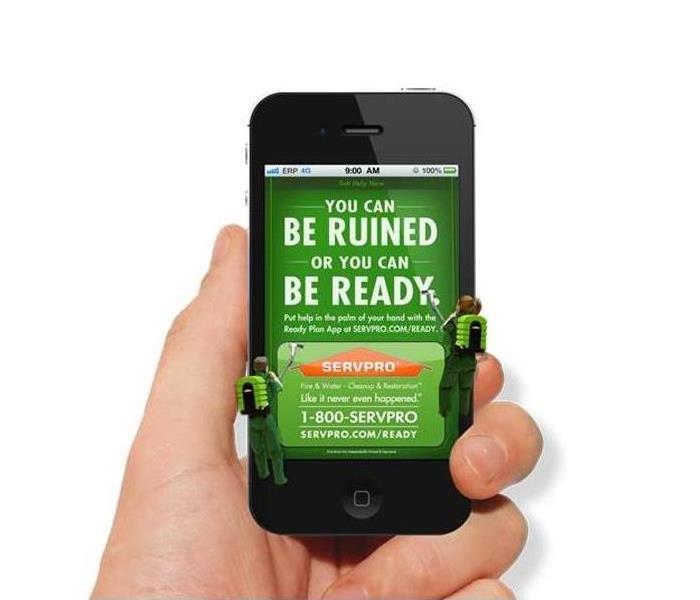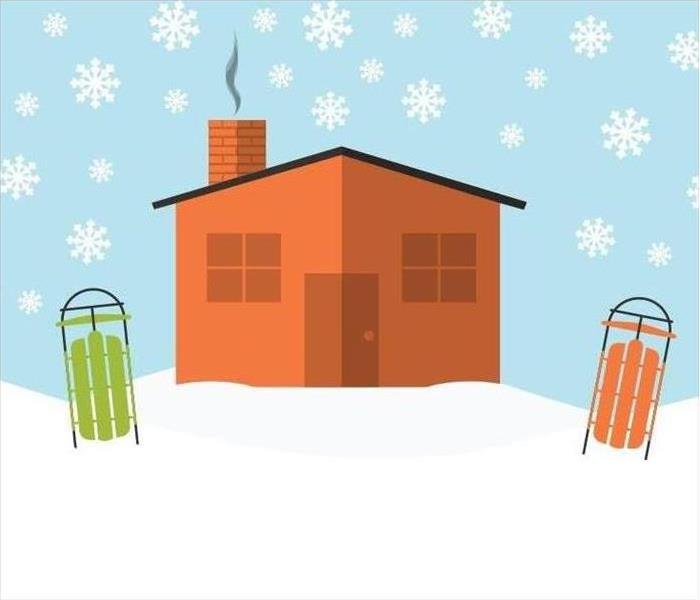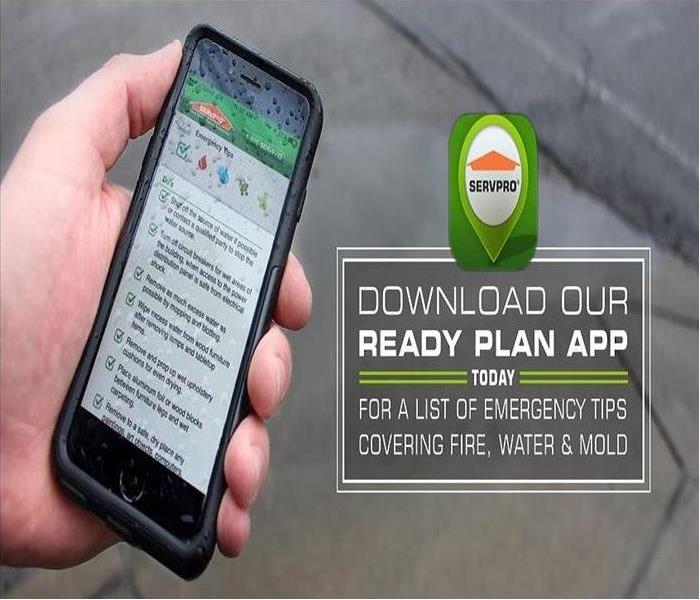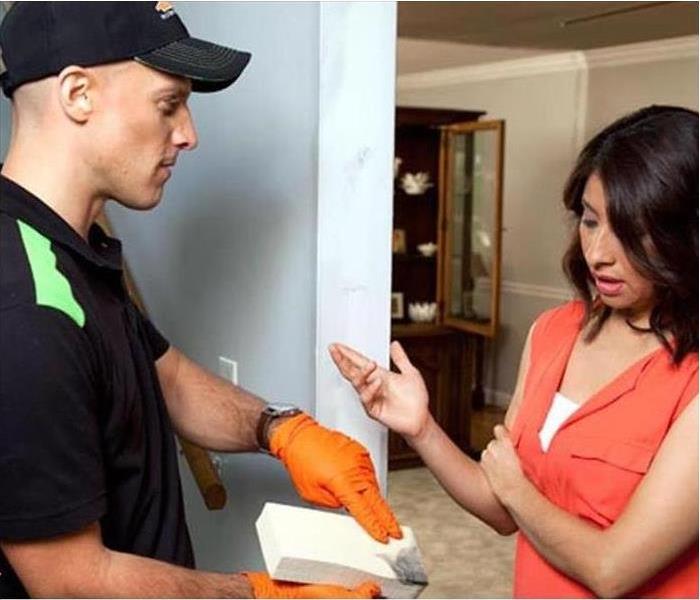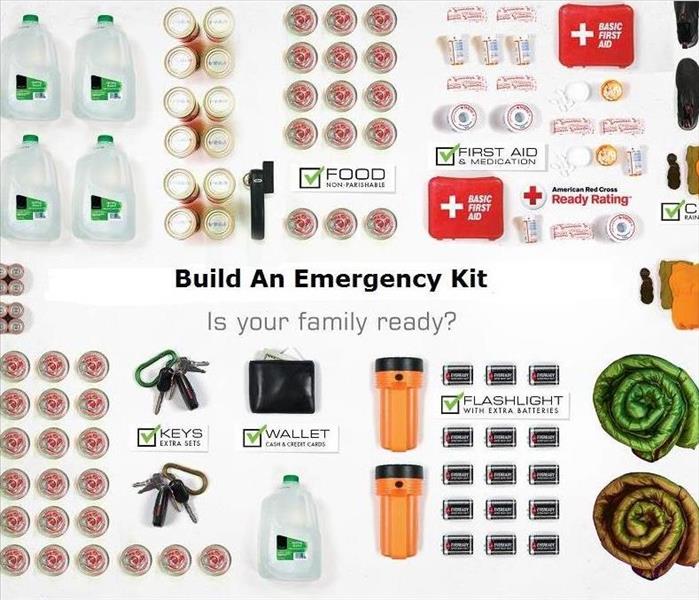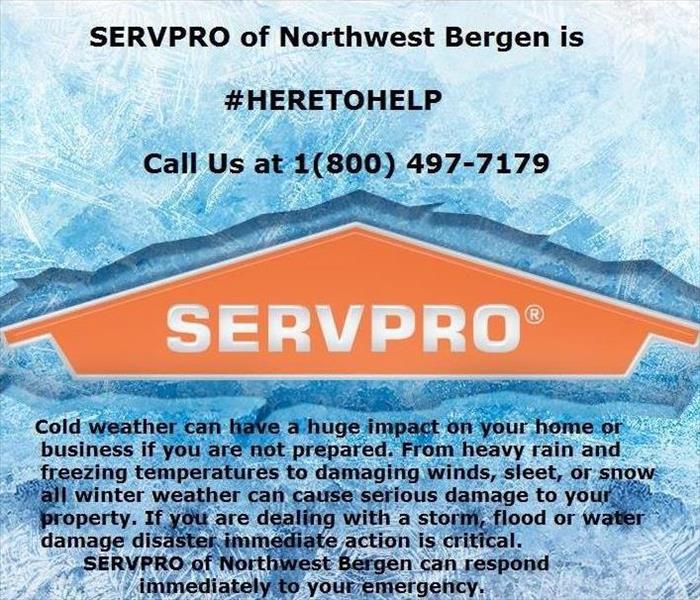Recent Storm Damage Posts
SERVPRO® of Northwest Bergen | Offers 24/7 Emergency Service after the Storm Flooding
3/21/2024 (Permalink)
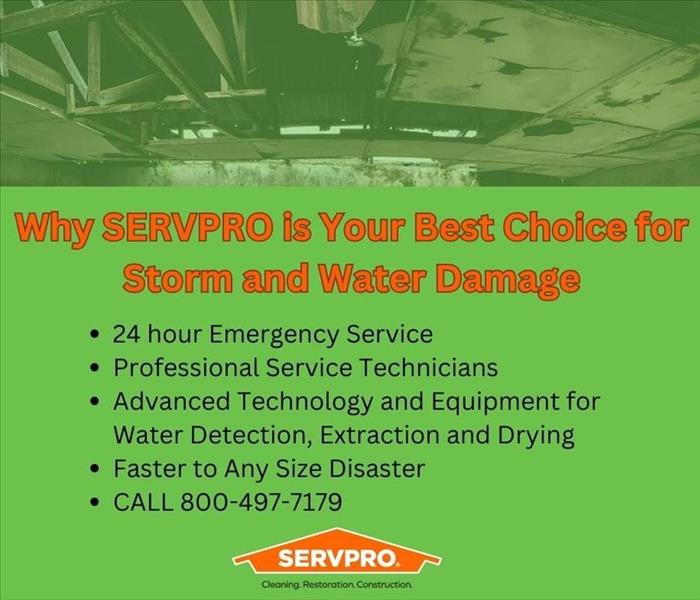 Call SERVPRO of Northwest Bergen if you have flooding from storm damage.
Call SERVPRO of Northwest Bergen if you have flooding from storm damage.
High-powered storms can bring many disasters to your doorstep. From extreme winds to heavy rains and flooding, they can all do serious damage to your home.
The type of storm and the events it causes can expose your home to multiple kinds of damage. Calculating your home’s potential level of damage is complicated and involves looking at your home’s qualities, age and the landscape surrounding it.
It’s essential to have basic storm damage knowledge, but it’s especially important for us in New Jersey, where powerful storms are common. Our regional government has created Weather Ready, which offers everything from a hyper-local weather radar to tips about how we can prepare for these kinds of disasters.
Look below at the main types of damage so you can better understand how to prepare for them:
Wind
Wind damage takes place when structures face strong gusts that can rip roofs off the building or even tear walls apart. While tornadoes and hurricanes are usually the culprits, traditional thunderstorms can cause 100 mph winds as well.
To prepare for wind damage, remove any excess limbs, large rocks or toys that might become dangerous debris during a powerful weather event. This will limit the number of objects that could potentially damage your home.
You should also have your roof inspected regularly to ensure it is able to withstand intense wind and storms.
Water
The damage that water can cause during and after a storm is also significant. High-volume rains can allow water to collect around your home, seeping inside through any possible location.
To mitigate the level of destruction from water, think about using landscaping methods that direct water away from your home. Or you could create a rain garden on your land to collect excess rainwater and prevent flooding.
You should also maintain your gutter so that they can assist with removing water from the roof. When water can collect up there, the results can be catastrophic, potentially even a roof collapse.
Impact
Damage done through impacts is another big problem with storms. Falling trees or flying debris are two of the main ways that this affects us, but you can help prevent impact damage.
By trimming trees around your home and removing any dead ones, you can lower the risk of one falling onto your home. You should also secure other objects outside of your house that could be picked up by wind and thrown into your structure or property, causing damage.
Weather disasters resulted in approximately $145 billion in damages last year in this country. This is why it’s important to follow these steps and take action before the storm strikes. Doing so could help you save countless amounts of money and stress associated with recovering from a disaster.
If you do happen to suffer storm damage, call SERVPRO of Northwest Bergen immediately. Our expert team will come ready for action, with a can-do attitude that will have you back in your home before you know it!
When you suffer storm-related damage to your home or business, it’s important that you know who to call! Contact us today to get your storm damage restoration started faster.
Protect Your Property From Floods With These Tips | SERVPRO® of Northwest Bergen
9/8/2022 (Permalink)
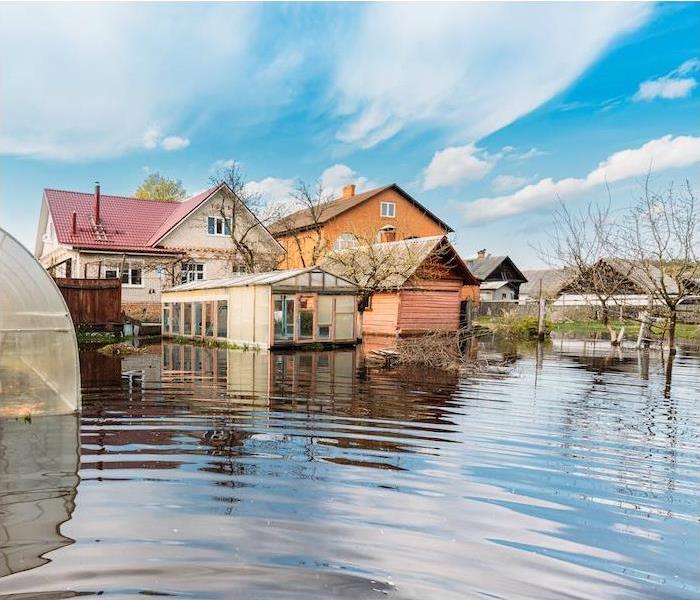 Experienced water damage in your home? Call SERVPRO of Northwest Bergen to get the restoration process started right away.
Experienced water damage in your home? Call SERVPRO of Northwest Bergen to get the restoration process started right away.
It doesn’t matter where you live—protecting your property from flooding is a key part of owning a home. It takes only an inch of water to begin serious destruction, so even low-risk regions must take action to prepare.
You can prepare the inside and outside of your home in many ways, but the best way to start is by learning about our regional risks. In New Jersey, we see flooding fairly regularly, given our low altitude and proximity to the coast. Nor’easters frequently rip through, leaving our streets soaked and our properties flooded.
After you know about the disasters we might see, you can begin to prepare for them the right way.
Protecting Your Home From the OutsideWeather is often unpredictable, meaning that heavy rainfall can fall out of the sky at random, leaving you wading through the water trying to save your yard. However, you can take time to prepare your home’s exterior to mitigate the risks.
Clean your gutters regularly and consider using landscaping techniques that direct water away from the structure of your home. You can also create one or more rain gardens around your property that will absorb excess water, keeping it away from your house.
Use these tips before the next storm arrives to ensure that the rush of floodwater won’t consume your home.
Flood Protection From the InsideIt’s equally as important to protect the inside of your home, and this starts with stopping any external sources of water. Inspect your foundation or basement and seal any creeks that may exist. If you frequently suffer flooding on your lowest level, consider adding a sump pump for added protection.
It’s important to note that flooding can begin from within your home, too, but with routine maintenance, you can lower the chance of this disaster affecting you. Check your plumbing and faucets for signs of damage or leaks, and address any issues immediately so that the damage can not compound.
Floodwater is disastrous regardless of where it comes from. Items like photographs, clothes and documents will suffer immediate damage upon contact with water, so keep anything truly integral inside a waterproof container.
To be most prepared, practice an emergency plan with your family and remember to follow it during the next storm so everyone can stay safe from the potential flood.
Experienced water damage in your home? Call SERVPRO today to get your restoration completed
Here’s How Knowing Emergency Alerts Could Keep You Safer | SERVPRO® of Northwest Bergen
8/21/2022 (Permalink)
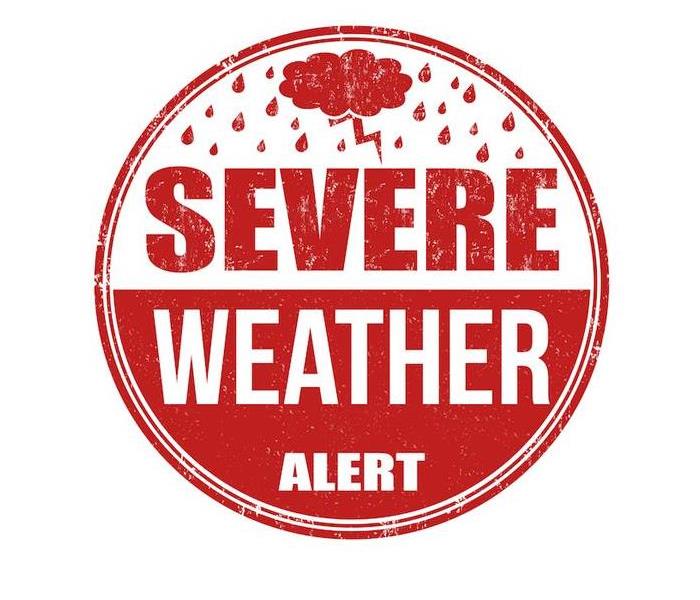 Know who to call when the next storm hits, call SERVPRO of Northwest Bergen 201-236-2400.
Know who to call when the next storm hits, call SERVPRO of Northwest Bergen 201-236-2400.
In our country, we use at least 42 different kinds of weather alerts, split between seven categories that cover every kind of weather event. This is too much for one person to know off the top of his or her head, especially when panicking during an extreme storm.
One thing that’s very important to know is the meanings of warnings, watches and advisories that could be issued for our area. Knowing these can help you decide what the next step is quicker, giving you more time to prepare.
It’s important to know about all kinds of weather, but it’s crucial for you to be aware of the most common events that we see here in New Jersey.
<h4alerts-are-issued">How Alerts Are Issued
Do you know how weather alerts are issued and planned? Well, the process is complex and affected by multiple factors. Weather forecasts make a prediction, but the severity, location and size of the storm require a lot of data to understand.
The National Weather Service is the main organization responsible for forecasting, collecting data and issuing warnings. They have split the country into six categories, each with its own headquarters, along with hundreds of local offices. Here in Bergen, we fall under the Eastern Region headquarters, which allows us to have more specialized alerts.
The NWS has many employees, including meteorologists and astronomers who collect data and formulate forecasts for the country. They use information from satellites, seismic meters and even the sun’s activity to create the most accurate predictions possible.
<h4most-important-alerts-to-understand">The Most Important Alerts to Understand
The most basic knowledge that everyone should have is the difference between a “watch” and a “warning.” These terms are used in virtually every extreme weather event, including thunderstorms, winter storms and floods.
A watch is telling you that a storm is closing in, and it has the potential to be dangerous for the people in your area. However, these alerts are often issued for large areas, with the main goal of keeping everyone up to date with the current situation.
A warning is only issued when danger is approaching your area quickly. These alerts are typically only for a single city or county, and they are highly specific. When a warning is issued for your area, you should begin taking immediate measures to protect your home and yourself.
It’s also very important for you to understand the weather that we see here in New Jersey, and in Northwest Bergen specifically. Having this information can help you prepare for the events that will likely put us at risk. We see an incredible 48 inches of rain per year, which is approximately 24% more than the national average.
<h4your-home-during-a-storm">Protecting Your Home During a Storm
Knowing what your local weather alerts mean is the best way to stay safe during extreme weather events, but you can also take action and reduce the damage done to your home with a few simple steps.
Clearing your gutters and securing your outdoor furniture can really help you slow storm damage, as clogged gutters can easily cause flooding during a thunderstorm.
Additionally, you should create an emergency plan for your household to help keep everyone safe from disaster.
Once the storm is gone, take plenty of photos and videos of any damage your home has suffered. Then, call SERVPRO of Northwest Bergen, since we’re available 24⁄7 to assist you with all cleanup and restoration.
As we said previously, the more you know about the weather risks in your area, the better you can prepare for them. Stay aware of the emergency alerts, and follow the guideline from your local officials for the best chance of weathering the next storm.
Experienced storm damage to your home or property? Contact us today for a quick response!
SERVPRO of Northwest Bergen wants You To Be Ready For Any Type of Storm
8/16/2022 (Permalink)
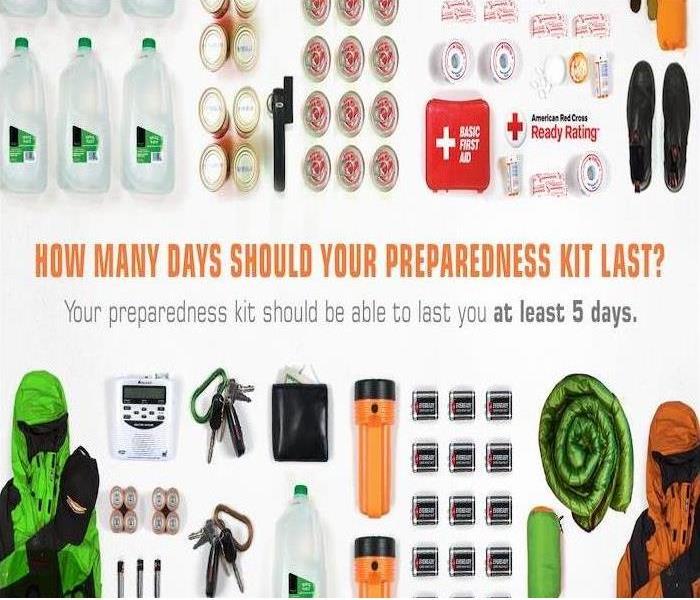 SERVPRO of Northwest Bergen is available 24/7 for emergency services call us at 201-236-2400.
SERVPRO of Northwest Bergen is available 24/7 for emergency services call us at 201-236-2400.
Are You Prepared for an Emergency?
Make sure your emergency kit is stocked with the items on the checklist below. Most of the items are inexpensive and easy to find, and any one of them could save your life. Headed to the store? Download a printable version to take with you. Once you take a look at the basic items, consider what unique needs your family might have, such as supplies for pets, or seniors.
After an emergency, you may need to survive on your own for several days. Being prepared means having your own food, water and other supplies to last for at least 72 hours. A disaster supplies kit is a collection of basic items your household may need in the event of an emergency.
Basic Disaster Supplies Kit
To assemble your kit, store items in airtight plastic bags and put your entire disaster supplies kit in one or two easy-to-carry containers such as plastic bins or a duffel bag.
A basic emergency supply kit could include the following recommended items:
- Water - one gallon of water per person per day for at least three days, for drinking and sanitation
- Food - at least a three-day supply of non-perishable food
- Battery-powered or hand crank radio and a NOAA Weather Radio with tone alert
- Flashlight
- First aid kit
- Extra batteries
- Whistle to signal for help
- Dust mask to help filter contaminated air and plastic sheeting and duct tape to shelter-in-place
- Moist towelettes, garbage bags and plastic ties for personal sanitation
- Wrench or pliers to turn off utilities
- Manual can opener for food
- Local maps
- Cell phone with chargers and a backup battery
If your home has water damage due to a storm, call the professional cleanup crew at SERVPRO of Northwest Bergen (201)236-2400 to help we offer storm damage cleanup and restoration visit Storm Damage Cleanup Services for more information.
Common Flooding Types & Causes | SERVPRO® of Northwest Bergen
4/12/2022 (Permalink)
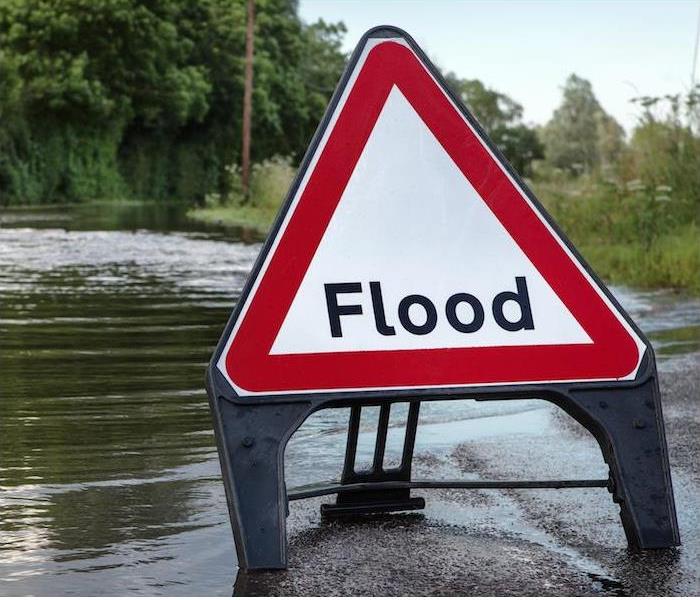 Regardless of the cause of the flooding, SERVPRO of Northwest Bergen has the team to help you recover from any disastrous event.
Regardless of the cause of the flooding, SERVPRO of Northwest Bergen has the team to help you recover from any disastrous event.
Flooding is the most prevalent natural disaster., impacting all 50 states and every territory in the United States. Though floods occur everywhere, there are distinctions in the forms and causes of flooding.
Floods are divided into three categories, each of which is triggered by one of four sources.
3 Types of Natural FloodingFlash floods occur when torrential rain falls or sits over a region, exceeding the ground’s capacity to hold moisture. Excess water rushes out, carrying with it everything, including trash cans, automobiles and all kinds of other debris.
River flooding means precisely what it sounds like. When a river’s banks are unable to absorb surplus water, the water flows over the edge, flooding the neighboring settlements and potentially causing significant damage.
Coastal floods are when storm surges or cyclonic activity force ocean or gulf levels to rise to flood levels near large bodies of water.
The 4 Most Common Causes of Natural FloodingHeavy rainfall. Storms with excessive rainfall, or storms that sit and linger over a location for a lengthy period of time, may create flash floods and river flooding. Because of the abundance of concrete and asphalt in cities, rain floods are more common, because there isn’t enough soil to absorb all of the water. In Bergen County, there are over 22,000 homes that have a higher than a 25% probability of being flooded in the next 30 years. This accounts for 8% of all homes in the county! Flooding can create plenty of other problems for Bergen County residents.
Oceanic activity. Storm surges, hurricanes and high tides may all cause wave water levels to increase, inflicting havoc on coastal regions.
Dams and levees failing. The most well-known example is the disastrous levee breakdowns during Hurricane Katrina in 2005. The structures break when levees or dams breach, or when excess pressure exceeds the dam’s capacity to manage the surge of water behind it.
Snowmelts and ice dams. Snow and ice may accumulate throughout the winter in areas of the nation where heavy snow and extended freezing temperatures are prevalent, and when they melt, rivers of water pour through neighboring cities. Ice dams, also known as ice dams, arise when rivers get clogged by ice transported downstream, forcing the banks to overflow.
Regardless of the cause of the flooding, SERVPRO has the tools and teams to help your home or business recover from its disastrous effects. Contact us anytime when flooding or water damage makes a mess in your life.
The Wide Range of Severe Weather in the U.S. | SERVPRO® of Northwest Bergen
3/8/2022 (Permalink)
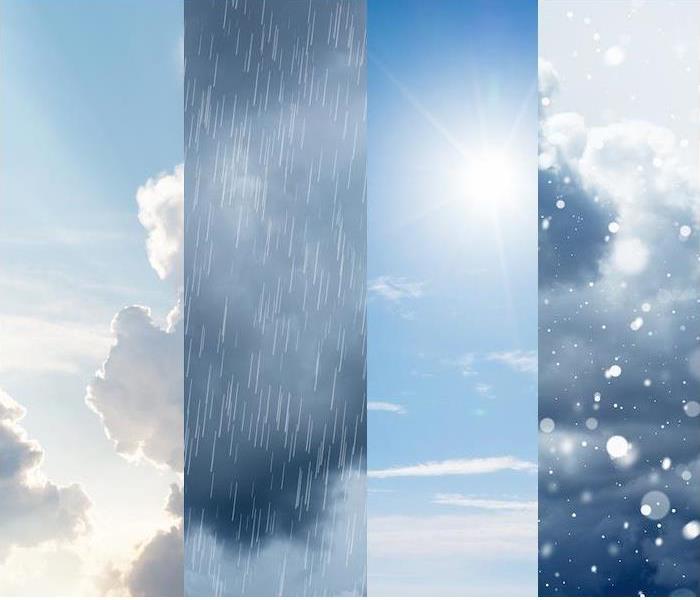 Extreme temperature changes can lead to the possibility of severe weather. SERVPRO of Northwest Bergen is a click away if you experience any damage.
Extreme temperature changes can lead to the possibility of severe weather. SERVPRO of Northwest Bergen is a click away if you experience any damage.
Given the enormity of the United States, the weather patterns from region to region are quite diverse. Each region has its own share of severe spring season weather with many various forms of weather threats.
In the Northeast, including New Jersey, winters are the longest and coldest in the country (as you are surely well aware of). Extreme weather events typically experienced in New Jersey include coastal nor’easters, snowstorms, spring and summer thunderstorms, flooding rains, heat and cold waves, tropical storms, and on rare occasions, hurricanes.
Flooding is a temporary overflow of water onto land that is normally dry. Floods are the most common natural disaster in the United States. Failing to evacuate flooded areas or entering flood waters can lead to injury or death.
Floods may:
- Result from rain, snow, coastal storms, storm surges and overflows of dams and other water systems.
- Develop slowly or quickly. Flash floods can come with no warning.
- Cause outages, disrupt transportation, damage buildings and create landslides.
If you are under a flood warning:
- Find safe shelter right away.
- Do not walk, swim or drive through flood waters. Turn Around, Don’t Drown!
- Remember, just six inches of moving water can knock you down, and one foot of moving water can sweep your vehicle away.
- Stay off bridges over fast-moving water.
- Depending on the type of flooding:
- Evacuate if told to do so.
- Move to higher ground or a higher floor.
- Stay where you are.
Preparing for a Flood
Make a plan for your household, including your pets, so that you and your family know what to do, where to go, and what you will need to protect yourselves from flooding. Learn and practice evacuation routes, shelter plans, and flash flood response. Gather supplies, including non-perishable foods, cleaning supplies, and water for several days, in case you must leave immediately or if services are cut off in your area.
In Case of Emergency
Keep important documents in a waterproof container. Create password-protected digital copies. Protect your property. Move valuables to higher levels. Clean drains and gutters. Install check valves. Consider a sump pump with a battery.
Even though your risk of severe weather is different than that of a friend or family member in another state, it is still crucial to be prepared. Everyone in the United States is at risk from a wide range of severe weather conditions.
If extreme weather leaves you with damage from water, fire or other elements, help is a click away. Contact SERVPRO for fast, expert recovery.
Winter Storms Are on Their Way Again—Here’s How to Prepare | SERVPRO® of Northwest Bergen
12/1/2021 (Permalink)
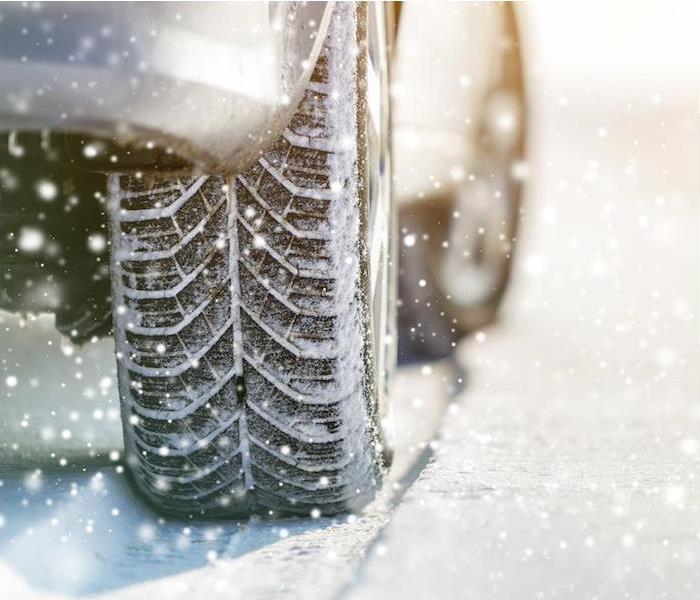 If winter weather should bring damage to your home or business, contact SERVPRO of Northwest Bergen for fast, restorative solutions.
If winter weather should bring damage to your home or business, contact SERVPRO of Northwest Bergen for fast, restorative solutions.
The promise of winter is beloved by some, derided by others. Whether you love the cold and the cheer of holiday and end-of-year festivities or you look forward to the new year when you can keep your head down and relax again, you probably don’t look forward to the inconvenience and potential hazards of winter weather.
Winters in Bergen County can bring all sorts of surprises and hazards, and the best way to keep yourself and your family safe is to start preparing now. You don’t want to be caught off-guard when Jack Frost comes at you with both barrels.
<h3your-family">Protect Your Family
In the event of a massive winter storm, you’ll want to have an emergency action plan upon which you and your family can fall back. Make sure everyone in the house knows what to do, where to meet and how to stay in contact during a crisis.
Your vehicles need to be ready as well. Make sure all your car batteries are in good working order, top off any necessary fluids, and have your brake pads changed and tires rotated or replaced as needed.
Your home and car both need emergency kits stocked with water, supplies and medical needs in the event of a shut-in situation or outage. Make sure to include a warm change of clothes and some sturdy shoes in your car kit.
<h3your-home">Protect Your Home
Frozen pipes send a chill down the spine at the mere thought, don’t they? Keep your faucets dripping when it’s bitter cold, and insulate pipes and spigots as necessary to keep them from bursting.
Speaking of insulation, take a peek in the attic and make sure your insulation situation up there is adequate. Poor insulation and window sealing waste energy and let cold air in to replace the warm air being provided by your heating unit.
Your heating unit or HVAC needs some love before winter drops. Let a pro examine it and perform any needed maintenance or upgrades. The cold of winter can really put your unit to the test, so you’ll want it to be in tip-top condition from the start.
<h3your-pets">Protect Your Pets
The bitter winter is uncomfortable and even dangerous for household pets. Make a comfortable place inside and invite them in during the cold.
If you have horses, livestock or special outdoor animals, make sure they have a good place to shelter and constant access to thawed water.
<h3for-melts-and-flooding">Watch for Melts and Flooding
Thaws on a large scale can create dangerous flooding, as local waterways become overrun when weather warms up. This same effect can cause your roof to leak as well, so be cognizant of ice dams, and let local news sources warn you about potential thaw flooding.
If winter weather should bring damage or flooding to your home or business, contact SERVPRO of Northwest Bergen County for fast, restorative solutions.
Take Precautions Against Summer Storms | SERVPRO® of Northwest Bergen
8/20/2021 (Permalink)
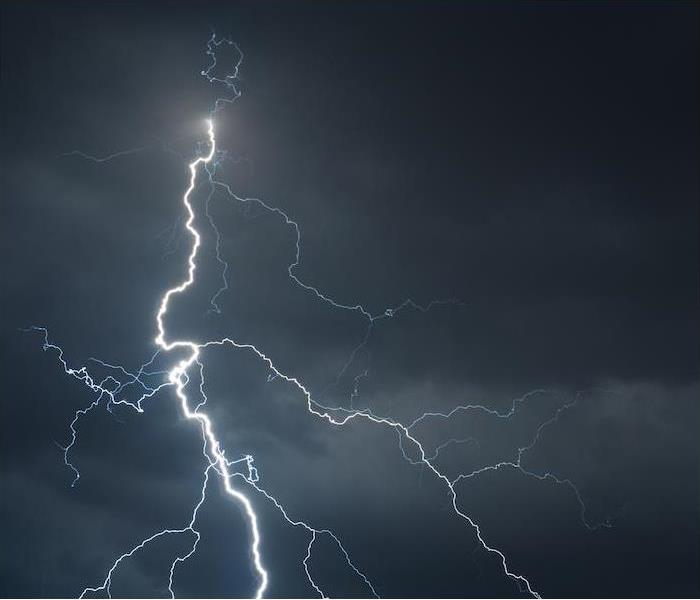 If storms cause damage to your home or business, SERVPRO of Northwest Bergen is available 24/7, ready to make things right.
If storms cause damage to your home or business, SERVPRO of Northwest Bergen is available 24/7, ready to make things right.
Summer in Mahwah or Ho-Ho-Kus probably means you’ve got lots of plans. Longer days full of sunshine call you outdoors to soak it all up while you can—maybe you’re headed into the city to root for the Bronx bombers, or maybe you’ve got plans to cool off at a local splash pad. But wherever you go, even in the sunniest time of the year, make sure you pack an umbrella.
Despite all the sunny weather (or truthfully because of it), Bergen County summers are actually more prone to produce thunderstorms than other seasons. July, for example, while not our rainiest month in terms of days, brings more precipitation than any other month, as summer warmth combines with atmospheric humidity to create afternoon and evening thunderstorms.
Be Storm-Alert
Storms can drop in with little notice during these months. If your local weatherperson issues an alert, or your weather app shows a storm icon, it’s time to get ready. An NOAA Weather radio on hand can be a handy asset as well, because it can keep you informed and focused, even if a storm knocks out your power.
If flooding is predicted, change your plans and stay indoors. You may need to take stock of the backyard as well, and move or tie down certain items that might blow over or wash away in a heavy storm.
Settling in for a storm doesn’t exactly thrill the heart as much as watching Aaron Judge thump baseballs, but it can be the difference maker in an emergency. A little extra caution or preparation could prevent many of the storm-related deaths each year.
Be Storm-Safe
Once the storm arrives, stay inside and safe. It’s dangerous outdoors until you’re 30 minutes past the last thunderclap.
Lightning can create problems indoors, too—showering, bathing, or standing near windows are all no-nos until the storm passes.
Hopefully, you’ve already got a stocked emergency kit, but now is the time to make sure it’s current. A mobile kit in the car can be a huge help as well if a surprise storm causes a need for evacuation.
If flooding does occur, stay out of the water at all costs, Aside from being physically dangerous, it’s also full of contaminants that can cause health effects.
After any water damage situation, your primary focus should be safety first:
- Is it safe to stay in the house?
- Electrical and "slip and fall" hazards are some of the most prevalent concerns.
- Only do activities that are safe for you to perform.
- Wet materials can be VERY heavy. Be careful!
There are any number of dangers that can come into play in a thunderstorm, and it’s always best to be cautious and put things on hold until storms safely pass.
If storms cause damage to your home or business, SERVPRO is on the line, ready to make things right again.
Be Flood Smart in Bergen County
8/17/2021 (Permalink)
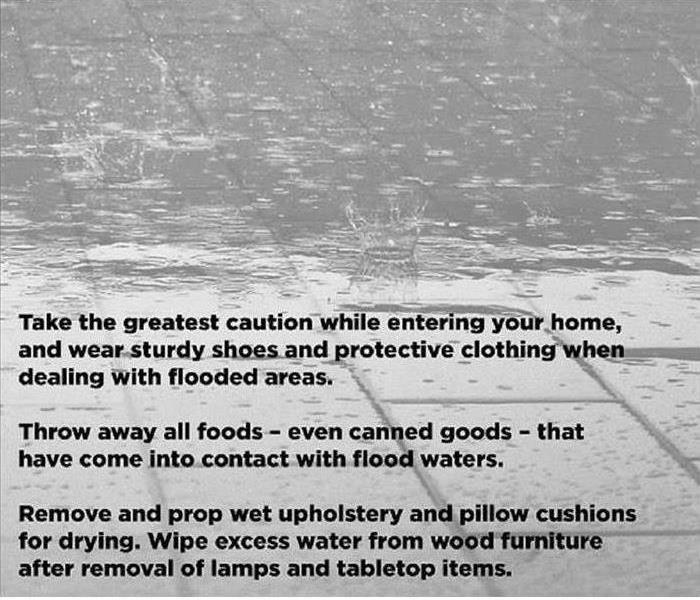 Call SERVPRO of Northwest Bergen to handle your water and storm damage disaster.
Call SERVPRO of Northwest Bergen to handle your water and storm damage disaster.
Water Damage from Heavy Rains and Flooding: Clean up & Restoration
Flooding from a storm or heavy rains can happen fast. After the recent storms in Bergen County, New Jersey many homes have suffered water damage that never had any before. In fact, 20% of all claims paid by the National Flood Insurance Program (NFIP) were for policies in low-risk communities.
The American Red Cross recommends having the following list of items packed and ready to go in the event of an emergency or evacuation due to flooding.
- Water-3+ day supply; one gallon per day per person
- Food-3+day supply of non-perishable, easy to prepare food
- Flashlight
- Battery-powered or hand crank radio (NOAA Weather Radio, if possible)
- Extra batteries (all sizes)
- First Aid Kit
- Medications (7 day supply) and medical items (hearing aids, glasses, contacts, syringes, canes)
- Multi-purpose tool, supplies to secure your home
- Personal hygiene items
- Copies of personal documents (medication lists, deed/lease to home, insurance policies, birth certificates)
- Cell phone with chargers
- Family and emergency contact information
- Extra cash
- Blanket
- Baby supplies, pet supplies
- Maps
- Extra car and house keys
- Extra clothing for both warm, cold and rainy weather-sturdy footwear
- Insect repellent and sunscreen
- Camera for photos of damage
Be prepared and make sure your family is safe, then call our trusted office staff at (201)236-2400 to schedule an appointment with SERVPRO of Northwest Bergen County to handle the water damage cleanup professionally and quickly before any secondary mold damage can take over and cause even more costly repairs.
After The Storm: SERVPRO of Northwest Bergen Is Here To Help
8/12/2021 (Permalink)
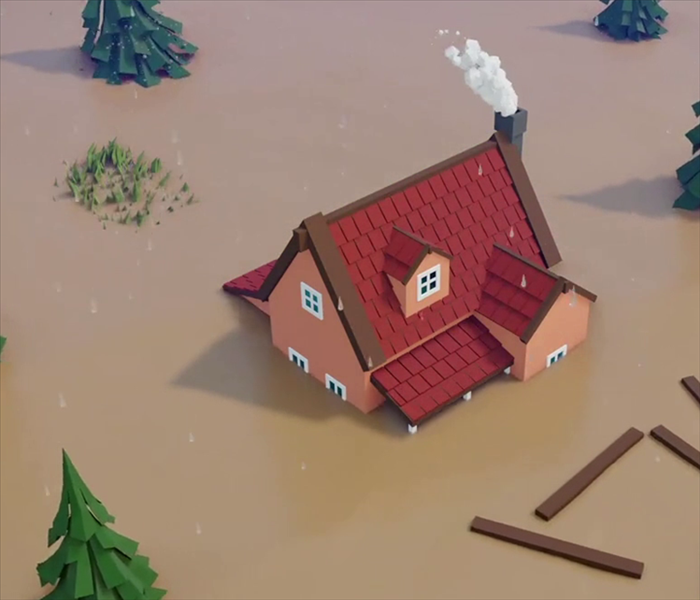 When you are dealing with any damage, immediate action is crucial. SERVPRO of Northwest Bergen is your local restoration expert.
When you are dealing with any damage, immediate action is crucial. SERVPRO of Northwest Bergen is your local restoration expert.
After any water damage situation, like a storm your primary focus should be safety first:
- Is it safe to stay in the house?
- Electrical and "slip and fall" hazards are some of the most prevalent concerns.
- Only do activities that are safe for you to perform.
- Wet materials can be VERY heavy. Be careful!
Floods from heavy rains is one of the most common and widespread natural disasters in the United States, and can happen to your Bergen County home. Whether your home or business is near a coastline, along a city street, in the mountains, near a river or even in a desert--there is always a potential for flood damage.
Floodsmart.gov reports, in the last 5 years, all 50 states have experienced floods or flash floods.
If a flood does strike your home or business, contact the professionals at SERVPRO of Northwest Bergen County, even minor floods can lead to major damage when not treated quickly and properly. Cleanup is often an overwhelming task for the average homeowner without the right equipment. SERVPRO of Northwest Bergen County Service Technicians can handle any size disaster large or small. Read Storm and Water Damage Tips
Severe Storms Are Becoming More Frequent and More Costly | SERVPRO® of Northwest Bergen
7/8/2021 (Permalink)
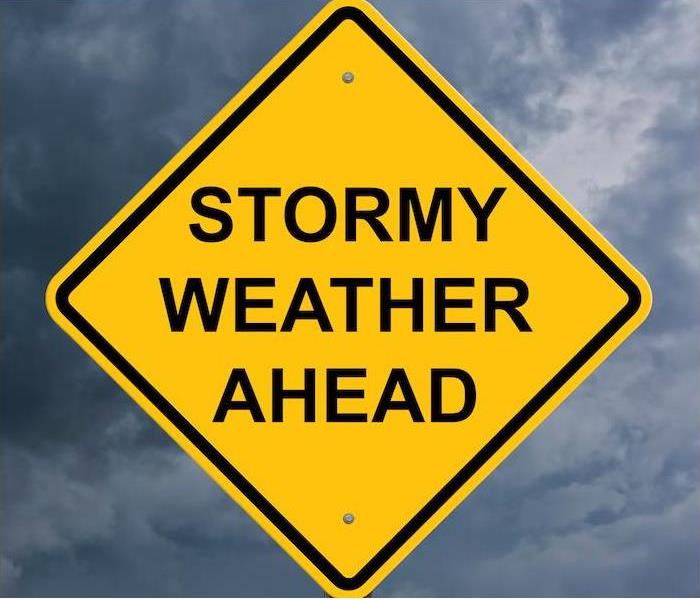 When storms do damage, we go to work to make things right. Contact SERVPRO of Northwest Bergen to start the restoration process.
When storms do damage, we go to work to make things right. Contact SERVPRO of Northwest Bergen to start the restoration process.
We’re all aware that 2020 was a challenging year but did you also know that 2020 saw more weather disasters than any previous year on record.
Once a storm hits the billion-dollar mark in terms of damage caused, it’s officially given the dubious moniker of “disaster.” The U.S. suffered 22 such events in 2020, and of course there were many other weather events that didn’t reach the disaster threshold—in fact, the National Weather Service didn’t prepare enough names to be able to keep up with all the Atlantic storms the year produced, so they ended up using Greek letters to serve as additional names.
Not Just Hurricanes
It’s easy to blame hurricanes for causing costly damages, because they’re so obviously devastating. But it so happened that the most expensive disasters of 2020 in the contiguous United States were thunderstorms and tornadoes.
Of the year’s 22 official disasters, 14 of them were storms or storm events like tropical storms Fay and Isaias, which dumped floodwaters and took out power for days at a time in the Bergen area.
To give you an idea of the power of a single storm: In August, a single storm system in Nebraska became a rare derecho (kind of like a tornado made up of cutting straight-line winds) took out over 100 million acres of corn fields—an area more than 150,000 square miles—threatening over 11% of the entire country’s corn production, and half the crop of the state.
Not Just 2020
While we hope for gentler years to come, it’s hard not to notice that 2020 was following a trend toward more extreme weather events. Each of the last 10 years has produced at least eight of the billion-dollar disasters, and several of those years have set records of their own, such as the $300 billion in damages caused by storms in 2017.
Precautions against storm and water damage should be part of every property owner’s routine. But should extreme weather overwhelm your preparation or cause unforeseen damage, remember SERVPRO is on call 24 hours a day for emergency help, and we’ll be there “Faster to Any Size Disaster.”
When storms do damage, we go to work to make things right. Contact SERVPRO today to see how we can help.
Flood Damage Cleanup Process and Tips
6/1/2021 (Permalink)
 SERVPRO of Northwest Bergen is an IICRC Certified restoration business.
SERVPRO of Northwest Bergen is an IICRC Certified restoration business.
Contact SERVPRO of Northwest Bergen to Provide Flood Damage Cleanup and Restoration in Your Bergen County Home
Flooding can cause damage, leading to serious issues both to the interior and exterior of a Bergen County home. Flooding can take place fast with minimal warning, and flood damage can leave your home requiring significant repairs. It can be overwhelming recovering from a flood and understand the steps to take afterward.
Floodwater can be dangerous
Floodwater can affect human health because there could be bacteria, viruses, pesticides, and sharp objects, among other biohazardous substances. SERVPRO of Northwest Bergen Technicians have the training and experience cleaning up, drying, disinfecting a flooded house safely.
Precautions you should take after a flood
After a flood, you should take some precautions to avoid injury and extensive damage to your property. They include:
- Avoid walking in floodwater and wear personal protective gear like boots and gloves if you must walk in it.
- Turn off the electricity at the mains.
- Call your insurance firm to inform it about the incident.
- Check your home for signs of damage that needs professional help to repair such as bulges or cracks in the walls and changes to the structure.
Restoring a flooded Property
The task of cleaning up your flood-damaged home can be a lengthy process, particularly in the case of severe water infiltration. Our SERVPRO crew seeks to understand the nature of the flood. The existence of biological or chemical contaminants, and sewage in the floodwater dictates the way we manage recovery. For standing water containing the above items, we have the equipment for extraction and safe disposal.
We also consider the height the floodwater reached and its rate of flow around and inside the building. We use powerful extractors to remove water quickly. Our team then uses air moving and dehumidifying equipment to dry the home. We also use deodorization, antibacterial and anti-fungal products to eliminate odors and microorganisms from the affected areas of a structure.
When your home has flood damage, call the company you can trust SERVPRO of Northwest Bergen at (201)236-2400 for an immediate response to your flood damage disaster. We are Faster To Any Size Disaster.
What Dangers Can Thunderstorms Cause? | SERVPRO® of Northwest Bergen
5/11/2021 (Permalink)
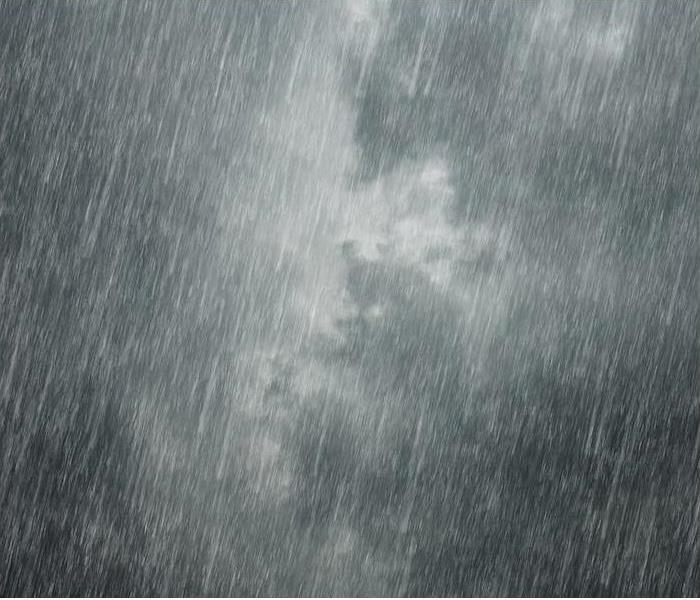 Thunderstorms can pop up at any moment. Contact SERVPRO of Northwest Bergen if you experience any damage.
Thunderstorms can pop up at any moment. Contact SERVPRO of Northwest Bergen if you experience any damage.
In the spring and summer, thunderstorms are a fairly regular occurrence—enough so that people tend to become immune to the threat they pose over time. While many thunderstorms occur without serious repercussions, with weather that severe, there is always the potential that damage will occur and danger is imminent.
Any storm that produces thunder is considered a thunderstorm—and any time there is thunder, there is lightning as well. A thunderstorm is upgraded to severe if winds reach a speed of 58 miles per hour and hail is greater than one inch in diameter, both of which can cause significant threats to your property and person.
The Threats That Severe Thunderstorms Pose
Damage and injury from lightning strikes. As previously mentioned, every thunderstorm contains lightning even if you are not able to see it. Lightning-related injuries occur approximately 300 times every year, and there are even more incidents reported of lightning causing house fires or causing trees to topple onto buildings. There are many myths about where lightning will and will not strike, but really, anywhere can become a viable target during a storm.
Property damage due to hail. While hail does not occur during every storm, if the thunderstorm is classified as severe that means hail will be present. Hail can present serious dangers to property, and can also cause injury if someone is caught outside in the storm. Hail has been known to not only dent cars, but also damage the siding and roofs of homes that are in its path due to the serious speeds it can fall at if conditions are right.
Harm from flash flooding. Though flooding is often associated with waterways, flash floods can occur for a variety of reasons during heavy rain. Storm drain backups and overwhelmed tributaries are extremely common, meaning that nearly anywhere can flood if the conditions are right. Floodwaters can knock people off their feet, carry away cars and cause significant injuries or death, so stay far away from any area that has rising water.
Thunderstorms are dangerous and can cause significant damage to homes or commercial spaces. If you have damage due to a thunderstorm, you can count on us to help. Contact us 24⁄7 for more information about our storm restoration practices.
Storm Damage: Cold Weather Issues
1/15/2021 (Permalink)
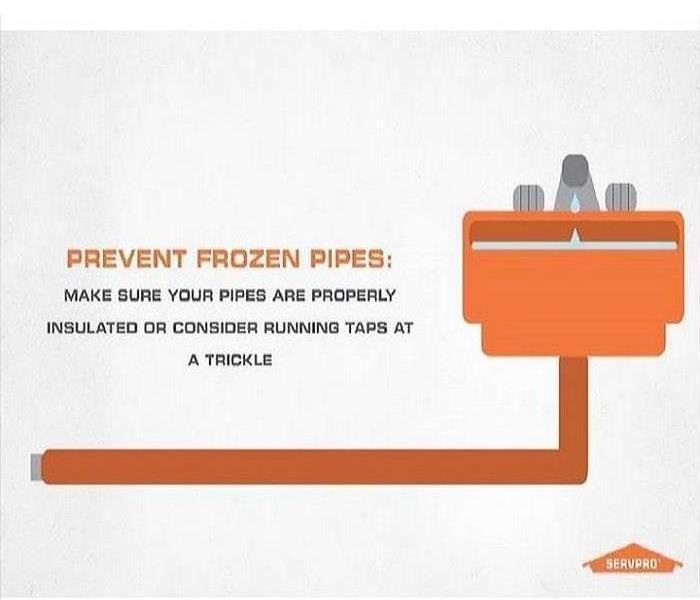 SERVPRO Tips
SERVPRO Tips
Winter weather can bring about more issues than just slippery roads and a sidewalk to shovel. In Northern New Jersey temperatures often sink below freezing level, and your property is at risk for frozen pipes, which can create a major disaster at your home or business. Frozen pipes are often those exposed to the cold weather, such as those outside your house, or in cold ares such as basements, attics, garages, or kitchen cabinets. A frozen pipe can burst at the point where the ice blockage inside the pipe is located, but typically the rupture is caused by the back-flow pressure between the water source and the blockage. A burst pipe can cause considerable damage to your property if not addressed quickly. to prevent pipes from freezing, here are a few steps you can take, according to The American Red Cross:
- Be sure to completely drain water from swimming pool and sprinkler lines, as well as outside hoses.
- Open kitchen cabinets to let warm air circulate near the plumbing.
- When weather is extremely cold, let water drip from faucets that may come from exposed pipes.
- Keep your heat set to the same temperature both day and night.
If you have any water damage caused by a burst pipe call SERVPRO of Northwest Bergen County at 1-800-497-7179.
To learn more about storm damage and our services visit our Storm Damage web page.
You Can Be Ruined or You Can Be READY! And SERVPRO of Northwest Bergen Can Help!
1/7/2021 (Permalink)
With the Help of Technology
Technology can be a vital tool in preparing for emergencies or disasters. The following are tips to help you be ready and use technology in the event of any flood or storm disaster.
Store Information Online
There are many places to store information securely online. Services like Google Drive, and Dropbox offer a free way to store different types of files, from a Word document to images of important documents. Ready.gov suggests saving an electronic version of insurance policies, identification documents, medical records and information on your pets if necessary.
Follow the News
Stay informed by following agencies such as FEMA, local news channels, and your local government on Twitter for the most up-to-date information in a disaster situation. You can also alert first responders if a rescue is needed through Twitter.
Mark Yourself Safe
The American Red Cross offers a Safe & Well Check-in site to list yourself as safe or find family and friends in situations where communication is difficult to establish.
Facebook also has a feature called Safety Check that is activated after natural disasters or a crisis. You will receive a notification from Facebook if you're located in the affected area at that time.
Get in Touch
Make sure your contact information is up-to-date in your phone and e-mail for communication with family, friends, business contacts and others whom you may need to contact before, during and after a disaster. SERVPRO has the READY Plan APP, download the APP and be READY for any fire, water or mold disaster.
Charge Up
Keep a portable charger in your car and home in case of an emergency. You may need to recharge this from time to time, but you can also buy solar-powered chargers as well.
Get an Emergency READY Profile
SERVPRO of Northwest Bergen offers an Emergency READY Profile (ERP) for free to help prepare you, your property or your business for an emergency. By having an ERP done in advance you minimize business interruption by having an immediate plan of action. Knowing what to do and what to expect in advance is the key to timely and cost effective mitigation. Call our office for more information regarding your ERP Profile for your property or business.
source: Restoration Newsline Vol 29, Issue 2
Are You Winter READY?
12/15/2020 (Permalink)
Are you and your Bergen County home prepared for the coming cold weather?Cold weather can have a huge impact on your home or business if you are not ready for it. From heavy rain and freezing temperatures to damaging winds, sleet or snow, all extreeme weather can cause serious and costly property damage. While you cannot control the weather, you can take steps to be prepared and help take the sting out of winter weather.
To help prevent costly damages due to weather, consider taking the following precautions to protect your property before colder weather hits.
- Check property for downed tree limbs and branches.
- Roofs, water pipes, and gutters should all be inspected to help ensure they are in proper working order. Gutter downspouts should be directed away from your foundation. Clear gutters of debris, leaves and other obstructions can cause a damming effect, which can lead to roof damage and interior water damage problems.
- Inspect handrails and stairwells as well as entryways to address and correct potential slippery surfaces.
- Protect water pipes from freezing by simply allowing water to drip when temperatures dip below freezing. If pipes are under cabinets, leave the doors open allowing warm air inside the cabinet. If the building has outdoor faucets, consider shutting water off at the main valve. Once the valve is off, open the outdoor faucets to ensure it drains.
- Call SERVPRO of Northwest Bergen about completing an Emergency Ready Profile for your business or downloading the READY Plan APP and list us as your damage restoration company.
CALL US TODAY AT 201-236-2400
Is Your Bergen County Home Ready For A Storm?
11/10/2020 (Permalink)
Weather can have a huge impact on your Bergen County home if you are not properly prepared. Whether it is heavy rain, freezing temperatures, damaging winds, sleet or snow, all can cause serious damage. While you cannot control weather, you can take steps to be prepared, and help take the sting out of winter weather.
- Check your property for downed tree limbs and branches.
- Roofs, water pipes, and gutters should all be inspected to ensure they are in proper working order. Obstructions can lead to roof damage and interior water problems.
- Inspect property for proper drainage to alleviate flood hazard potential.
- Protect water pipes from freezing by simply allowing water to drip when temperatures dip below freezing. If pipes are under cabinets, leave the doors open allowing warm air inside. If you have outdoor faucets, turn off the water at the main valve.
- Ask SERVPRO of Northwest Bergen about completing an Emergency READY Profile for your business. The ERP is a no cost assessment of your facility, and provides you with a plan to get back in business fast following a disaster. For residential customers download the ERP App and input your property information, and emergency contacts. SERVPRO of Northwest Bergen can be listed as your emergency contact for storm, flood, water, fire and biohazard damage restoration. Give us a call today 201-236-2400.
After The Storm: Leaks May Cause Mold Growth
10/21/2020 (Permalink)
Did You Know? There is a Water Damage Timeline
Intrusion of water into your home from a storm can result in mold growth. When water damages are not addressed right away, the result is an increased risk of harmful mold growth. Mold may appear within 24 to 48 hours after a water damage intrusion event if the conditions are conducive to mold growth.
SERVPRO of Northwest Bergen located in Northern New Jersey handles water damages every day, and we know prompt action is required to prevent mold growth. By utilizing the proper equipment and moisture measuring devices, your home or business building will be quickly and thoroughly dried to industry standards, which helps prevent secondary damage like mold growth.
Water Damage Timeline
Within Minutes:
- Water quickly spreads throughout your property, saturating everything in its path.
- Water is absorbed into walls, floors, upholstery, and belongings.
- Furniture finishes may begin to bleed, causing permanent staining on carpets.
- Photographs, books, and other paper goods start to swell and warp.
Hours 1-24:
- Drywall begins to swell and break down.
- Metal surfaces begin to tarnish.
- Furniture begins to swell and crack.
- Dyes and inks from cloth and paper goods spread and stain.
- A musty odor appears. Mold spores grow if conditions are conducive to microbial growth.
Before risking further damage to you home, and belongings don't try to clean a water damage incident on your own, instead call SERVPRO of Northwest Bergen County at (201) 236-2400 to handle the water damage cleanup and restoration.
Plan Ahead and Build an Emergency Kit
3/7/2019 (Permalink)
Be Prepared at your home or business with an Emergency Kit. https://www.ready.gov/ suggests you have enough supplies to last for at least three days. Below are some suggested items to include in your kit.
- 3-day Supply of non-perishable food
- Water-One gallon per person per day
- First-aid kit
- Prescription Medication
- Sleeping bags and blankets
- Fire Extinguisher
- Hygiene products
- Flashlights
- Extra Batteries
- Cell phone charger
- Change of clothes
- Matches in weatherproof container
- Wrench or pliers to turn off utilities
- Whistle to signal for help
- Pet supplies
- Infant supplies
- Important documents in weatherproof container (insurance documents, bank records, IDs)
You can also keep a condensed Emergency Kit in your vehicle as well. For a more extensive kit go to ready.gov/
Winter Weather Worries
2/22/2019 (Permalink)
Winter weather and temperatures falling below freezing can bring about home water damage issues such as frozen pipes and ice dams. These damages are costly to repair and in most instances can be prevented.
Frozen Pipes
Frozen pipes are not only those exposed to the cold weather, such as outdoor pipes, but also pipes in cold areas like basements, attics, garages and kitchen cabinets. A frozen pipe can burst at the point where the ice blockage inside the pipe is located, but the rupture is caused by the backflow pressure between the water source and the blockage. A burst pipe can cause considerable damage to your home if not properly and quickly fixed.
According to The American Red Cross here are some tips to prevent pipes from freezing:
- Drain water completely from swimming pool, sprinkler system and outside hoses.
- Open kitchen cabinets to let warm air near plumbing.
- In extreme cold, let water drip from faucets that may come from exposed pipes.
- Keep your heat set at the same temperature day and night. The temperature should not be set below 55°f
Ice Dams
Ice dams can cause major damage during the snowy season. They form when heated air melts roof snow downward into water dammed behind still frozen ice. When the trapped water cannot run into the gutter system, it can backflow under the roof's shingles and into the structure's interior areas, as well as causing gutters and shingles to move or fall. Icicles can be an initial sign of an ice dam, (source Travelers.com) check for water stains or moisture in your attic or along ceiling of exterior walls in your home. These are indicators that ice dams have occurred and water has penetrated the roof membrane. Remove the ice dam quickly to prevent major water damage to your homes exterior and interior. Using heated cables, a roof shovel, or calcium chloride ice melt can be used to alleviate the ice dam problem.
If winter weather causes water damage to your property, SERVPRO has trained professional technicians ready to restore your property.




 24/7 Emergency Service
24/7 Emergency Service














